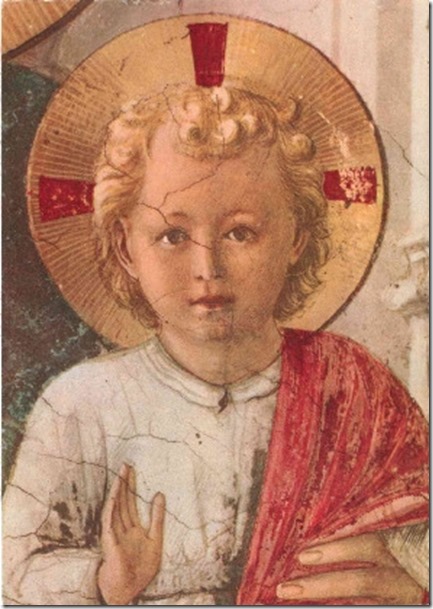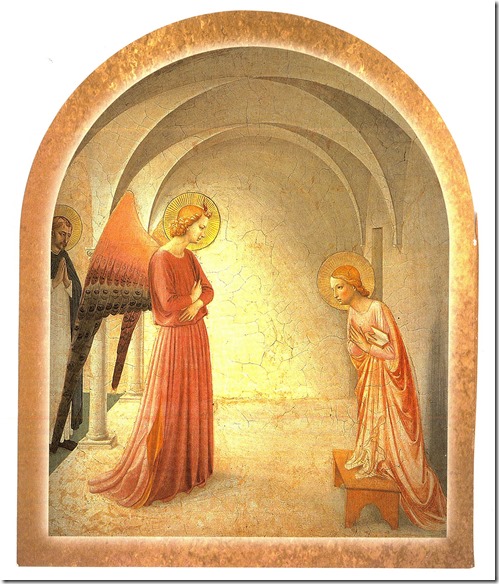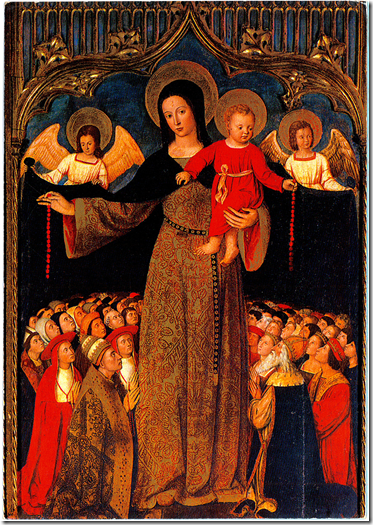Ten aids to mental prayer
By Dom Jean-Baptiste Chautard
(1858-1935)
Abbot of the French Cistercian Monastery of Sept-Fons
This text is an appendix of the book “The soul of the Apostolateâ€, which was a favorite book of Pope Saint Pius X. The good Pope said he left this spiritual masterpiece by his night stand, so he could read it in his bed.
Mental prayer is the furnace in which we go to renew the custody of the heart. By our fidelity to our mental prayer all the other exercises of piety will be rekindled. The soul will gradually acquire vigilance and the spirit of prayer, that is, the habit of having recourse to God more and more frequently.
Union with God in mental prayer will produce an intimate union with Him, even amongst the most absorbing occupations.
The soul, living thus in union with our Lord, by its vigilance, will attract more and more the gifts of the Holy Ghost and the infused virtues, and perhaps God will call it to a higher degree of mental prayer.
That excellent volume, “The ways of Mental Prayer†by Dom Vital Lehodey (Lecoffre, Paris), gives an exact account of what is required for the ascension of the soul by the different degrees of mental prayer, and gives rules for discerning, whether higher mental prayer is truly a gift of God or the result of illusion.
Before discussing affective mental prayer (the first degree of the higher classes to which God as a rule calls only the souls that have reached the state of vigilance by meditation), Fr. Rigoleuc, S.J., gives in his fine book (Å’uvres Spirituelles, Avignon, 1843, page 1 ff.) ten ways of discoursing with God – when after a serious effort, one finds it a moral impossibility to meditate on a subject prepared the night before.
I sum up the pious author:
1st Way. – Take a spiritual book (New Testament or “Imitation of Christâ€) – read a few lines at intervals – meditate a little on what has been read, try to fix the sense and impress it on your mind.   Draw from it some holy thought, love, penance etc., resolve to practice this virtue when opportunity offers.
Avoid reading or meditating too much. Stop at each pause as long as the mind find agreeable and useful converse.
2nd Way. – Take some text of Scripture or some vocal prayer – Pater, Ave, Credo, for instance – repeat it, stopping after each word, drawing from it various sentiments of piety on which you dwell as long as it pleases you.
At the end, ask God for some grace or virtue, according to the subject meditated upon.
You are not to stop on any word if it wearies or tires you, but if you find nothing more to think on, pass on quietly to another. When you are touched by some good thought, dwell on it as long as it lasts without troubling to go any further.  Nor is it necessary to make fresh acts always, it is sometimes enough to keep in God’s presence, reflecting in silence on the words already meditated or in enjoying the feelings they have already produced in your heart.
3rd Way. – When the prepared subject matter does not give you enough scope, or room for free action, make acts of faith, adoration, thanksgiving, hope, love, and so on, letting them range as wide and free as you please, pausing at each one to let it sink in.
4th Way. – When meditation is impossible, and you are too helpless and dried-up to produce a single affection, tell Our Lord that it is your intention to make an act, for example, of contrition, every time you draw breath, or pass a bead of the rosary between your fingers, or say, vocally, some short prayer.
Renew this assurance of your intention from time to time, and then if God suggests some other good thought, receive it with humility, and dwell upon it.
5th Way. – In time of trial or dryness, if you are completely barren and powerless to make any acts or to have any thoughts, abandon yourself generously to suffering, without anxiety, and without making any effort to avoid it, making no other acts except this self-abandonment into the hands of God to suffer this trial and all it may please Him to send.
Or else you may unite your prayer with Our Lord’s Agony in the garden of desolation upon the cross.  See yourself attached to the Cross with the Saviour and stir yourself up to follow His example, and remain there suffering without flinching, until death.
6th Way. – A survey of your own conscience. – Admit your defects, passions, weaknesses, infirmities, helplessness, misery, nothingness. – Adore God’s judgments with regard to the state in which you find yourself. – Submit to His holy will. – Bless Him both for His punishments and for the favors of His mercy. – Humble yourself before His sovereign Majesty. – Sincerely confess your sins and infidelities to Him and ask Him to forgive you. – Take back all your false judgments and errors. – Detest all the wrong you have done, and resolve to correct yourself in the future.
This kind of prayer is very free and unhampered, and admits of all kinds of affections. It can be practiced at all times, especially in some unexpected trial, to submit to the punishments of God’s justice, or as a means of regaining recollection after a lot of activity and distracting affairs.
7th Way. – Conjure up a vivid picture of the Last Things. Visualize yourself in agony, between time and eternity – between your past life and the judgment of God. – What would you wish to have done? How would you want to have lived? – Think of the pain you will feel then. – Call to mind your sins, your negligence, your abuse of grace. – How would you like to have acted in this or that situation? – Make up your mind to adopt a real, practical means of remedying those defects which give you reason for anxiety.
Visualize yourself dead, buried, rotting, forgotten by all. See yourself before the Judgment-seat of Christ: in purgatory—in hell.
The more vivid the picture, the better will be your meditation.
We all need this mystical death, to get the flesh off of our soul, and to rise again, that is, to get free from corruption and sin. We need to get through this purgatory, in order to arrive at the enjoyment of God in this life.
8th Way. — Apply your mind to Jesus in the Most Blessed Sacrament. Address yourself to Our Lord in the Blessed Sacrament. With all the respect that His Real Presence demands, unite yourself to Him and to all His operations in the Eucharist, where He is ceaselessly adoring, praising, and loving His Father, in the name of all men, and in the condition of a victim.
Realize His recollection, His hidden life, His utter privation of everything, obedience, humility, and so on. – Stir yourself up to imitate this, and resolve to do so according as the occasions arise.
Offer up Jesus to the Father, as the only Victim worthy of Him, and by whom we offer homage to Him.  Thank Him for His gifts, satisfy His justice, and oblige His mercy to help us.
Offer yourself to sacrifice your being, your life, your work. Offer up to Him some act of virtue you propose to perform, some mortification upon which you have resolved, with a view to self-conquest, and offer this for the same ends for which Our Lord immolates Himself in the Holy Sacraments. – Make this offering with an ardent desire to add as much as possible to the glory He gives to His Father in this august mystery.
End with a spiritual Communion.
This is an excellent form of prayer, especially for your visit to the Blessed Sacrament. Get to know it well, because our happiness in this life depends on our union with Jesus in the Blessed Sacrament.
9th Way. — This prayer is to be made in the name of Jesus Christ. It will arouse our confidence in God, and help us to enter into the spirit and the sentiments of Our Lord.
Its foundation is the fact that we are united to the Son of God, and are His brothers, members of His Mystical Body; that He has made over to us all His merits, and left us the legacy of all the rewards owed Him by His Father for His labors and death. And this is what makes us capable of honoring God with a worship worthy of Him, and gives us the right to treat with God, and, as it were, to exact His graces of Him as though by justice. – As creatures, we have not this right, still less as sinners, for there is an infinite disproportion between God and creatures, and infinite opposition between God and sinners. But because we are united to the Incarnate Word, and are His brothers, and His members, we are enabled to appear before God with confidence, and speak familiarly with Him and oblige Him to give us a favorable hearing, to grant our requests, and to grant us His graces, because of the alliance and union between us and His Son.
Hence, we are to appear before God either to adore, to praise, or to love Him, by Jesus Christ working in us as the Head in His members, lifting us up, by His spirit, to an entirely divine state, or else to ask some favor in virtue of the merits of His Son. And for that purpose we should remind Him of all that His well beloved Son has done for Him, His life and death, and His sufferings, the reward for which belongs to us because of the deed of gift by which He has made it over to us.
And this is the spirit in which we should recite the Divine Office.
10th Way. – Simple attention to the presence of God, and meditation.
Before starting out to meditate on the prepared topic, put yourself in the presence of God without making any other distinct thought, or stirring up in yourself any other sentiment except the respect and love for God which His presence inspires. – Be content to remain thus before God, in silence, in simple repose of the spirit as long as it satisfies you. After that, go on with your meditation in the usual way.
It is a good thing to begin all your prayer in this way, and worth while to return to it after every point. – Relax in this simple awareness of God’s presence. – It is a way to gain real interior recollection. – You will develop the habit of centering your mind upon God and thus gradually pave the way for contemplation. – But do not remain this way out of pure laziness or just to avoid the trouble of making a meditation.






